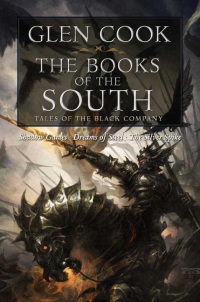The Books of the South is an omnibus collection of the next three novels of the Black Company series, consisting of Shadow Games, Dreams of Steel and The Silver Spike. The former two novels cover the adventures of what remains of the Black Company, now led by Croaker, as they venture southwards in search of the mercenary company’s origins. The latter novel covers the splinter rebel band led by the White Rose and various free agents as well as the remains of the empire under new leadership as all factions squabble in the fallout of the huge battle against the Dominator.
Of the three books, The Silver Spike is perhaps the most satisfying as it at least brings the story of several key characters to a definitive close whereas the other two end on a “to be continued” note. Following the devastation of the epic Battle of the Barrowland depicted in The White Rose, the White Rose herself, Silent and a small group of survivors become embroiled in a conflict around the silver spike used to trap the essence of the Dominator. A band of rogues realize that the spike is immensely valuable and concoct a plan to steal it. Meanwhile, the remnants of the Lady’s Empire tries to restore order.
One of the oddest things about this novel is that without the actual Black Company around, their closest analogues are not the rebels of the White Rose as you might expect, but the band of rogues who start all the trouble in the first place. They start out as a nasty, greedy group but they end up being the most sympathetic characters in the book for being able to outsmart both the rebels and the imperials. That said, by the end of the book their exploits make them implausibly badass since they manage to out-Raven Raven. Poor Raven and Silent are both victims to the Worf Effect in this book, as if leaving the Black Company meant instant depowering.
The other books describe how the few remaining members of the Black Company including the wizards Goblin and One Eye the follow Croaker, who now wears multiple hats as Captain, Physician and Annalist, to the south. Legend has it that the Black Company is the last of the Free Companies of Khatovar but nowadays no one actually knows what that means or even where Khatovar actually is. For lack of a more concrete objective, Croaker decides to return the annals to Khatovar and rediscover the lost origins of the company. The Lady, her sorcerous abilities now lost, tags along.
The farther south they travel the darker the Black Company’s origins seems to be as their forebears appear to have engaged in wanton slaughter and massacre. Everyone in the south it seems knows what the Black Company is and why its reputation is so fearsome except the members of the company themselves. Eventually their progress is stopped by a war between the country of Taglios and a new and fast growing empire farther to the south led by the mysterious Shadowmasters. To no one’s surprise the company throws in their lot with the Taglians and so war it is once more.
One of the most frustrating things about the three novels is that surprise, surprise, once again new villains turn out to old villains formerly thought dead. It’s like a bad comic book in which no one ever dies for good. I mean, how many times does the Black Company need to kill the Limper? It’s ridiculous how they go to over the top lengths to dispose of the bodies only to see them come back again and again. Another peeve is that inconsistent characterization is all over the place. Raven’s and Silent’s dramatic drop in badassery is the most glaring example, but equally galling is Mogaba’s face-heel-turn in Dreams of Steel and the Lady’s incomprehensible failure to actually use the True Names of the old Taken to destroy them despite repeated reminders that she knows them.
I’m also disappointed that the longer the series goes on the farther it strays from the original conceit of being the actual annals of a mercenary company. The customary introduction to each book still makes the pretense but the text describes things that the supposed annalist could never possibly know so the street level viewpoint of grand events is lost. Also lost is the small unit tactics that made reading the early books so much fun. Ironically the closest thing to this is in The Silver Spike when the imperials use clever traps and tricks to delay and inconvenience the Limper with minimal use of sorcery just like the Black Company did back in the day.
Still the whole thing is pleasant and easy to read and I’m curious enough about the origins of the Black Company to eventually get around to reading the remaining books. At the same time, it’s fair to say that this is now just another fantasy series and the verisimilitude and plain soldier point of view that were the original hooks for the series are now mostly gone. It is kind of ironic that this series originally became famous for subverting some common fantasy tropes of its time but as it aged it the subverted tropes became the new normal while it also gradually became more generic fantasy. I don’t hope that the novels included in the new collection can add anything fresh. I just hope that they’re not too incompetent.
